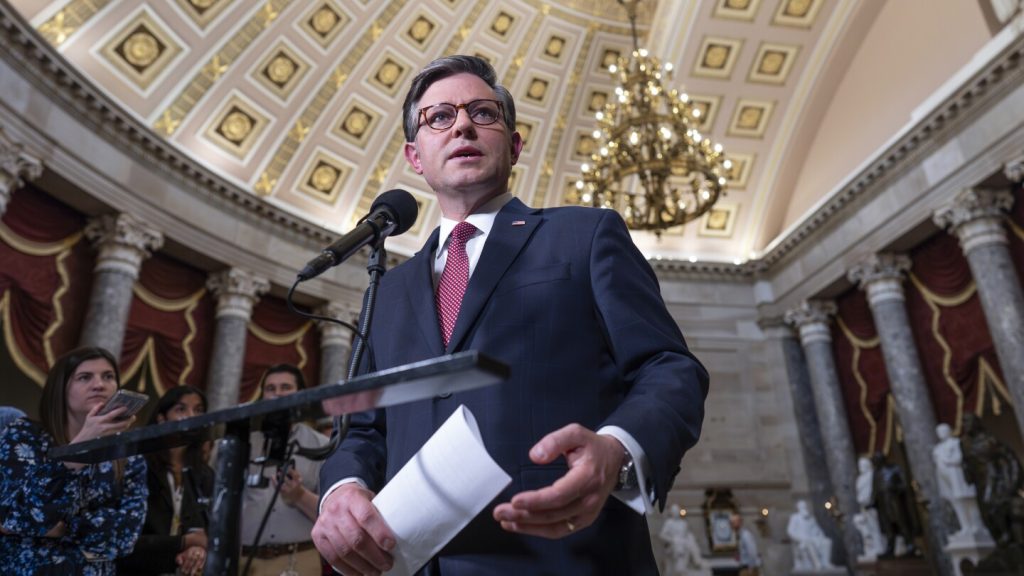President Joe Biden expressed strong support for a proposal from Republican House Speaker Mike Johnson to provide aid to Ukraine, Israel, and Taiwan, urging the House to pass the $95 billion funding package this week. Johnson faced backlash from his own party for supporting Ukraine, but he stood firm on his decision, emphasizing the critical importance of standing with allies during this time. The aid package includes funding for weapons and economic assistance for Ukraine, along with support for Israel and allies in the Indo-Pacific region. Biden emphasized the need for bipartisan cooperation in swiftly approving the aid to send a strong message of support to the world.
Johnson’s plan includes three separate funding packages for Ukraine, Israel, and allies in the Indo-Pacific, as well as additional foreign policy proposals in a fourth bill. The bulk of the money for Ukraine would go towards purchasing weapons and ammunition from U.S. defense manufacturers, with a portion structured as forgivable loans for economic assistance to Kyiv. The decision to support Ukraine has sparked backlash from populist conservatives in the House and raised concerns about Johnson’s position as Speaker. Despite facing challenges, Johnson remains committed to pushing the aid package through the House with bipartisan support.
To advance his complex aid plan, Johnson needs Democratic support on procedural maneuvers in the House. He plans to hold separate votes on each part of the aid package and form unique voting blocs for each issue to navigate the political divisions on foreign policy within the House. The package also includes various foreign policy proposals, such as legislation to seize frozen Russian assets and place sanctions on countries like Iran, Russia, and China. The House proposal extends the time period for TikTok’s China-based owner to sell its stake, reflecting bipartisan efforts to address national security concerns.
House Democratic Leader Hakeem Jeffries emphasized the party’s commitment to standing by democratic allies in Ukraine, Israel, and the Indo-Pacific, while also providing humanitarian aid for civilians in conflict zones like Gaza. Progressive Democrats have expressed opposition to providing aid that could be used in campaigns like Israel’s offensive in Gaza. The threat to oust Speaker Johnson from within his own party has gained momentum, with Rep. Marjorie Taylor Greene and others calling for his resignation. Johnson’s efforts to appease conservatives with a separate border security vote have been met with criticism, highlighting the challenges he faces in maintaining party unity.
As Johnson fights to secure support for the aid package, he has garnered backing from Republican governors, conservative leaders, and religious figures. Georgia Governor Brian Kemp urged House Republicans to prioritize important issues facing the nation and maintain focus amid internal disagreements. Despite expressing unity with former President Trump on certain agenda items, Johnson faces opposition from some within his party for his stance on foreign aid and national security issues. Amidst concerns about his position as Speaker, Johnson remains focused on passing the aid package to support allies facing threats from countries like Russia.
The urgency to pass the foreign aid package comes as tensions rise in Ukraine and concerns grow about the country’s precarious situation. Pentagon leaders have highlighted the urgent need for military weapons for Ukraine and Israel, with Defense Secretary Lloyd Austin noting shifts on the battlefield in favor of Russia. The House legislation pushes for the provision of long-range missile systems to Ukraine, while also granting the president discretion on sending them based on national security interests. The aid bill reflects bipartisan efforts to address global challenges and support allies in times of crisis. Despite facing challenges, Johnson remains determined to fulfill his responsibilities as Speaker and prioritize the nation’s interests.


